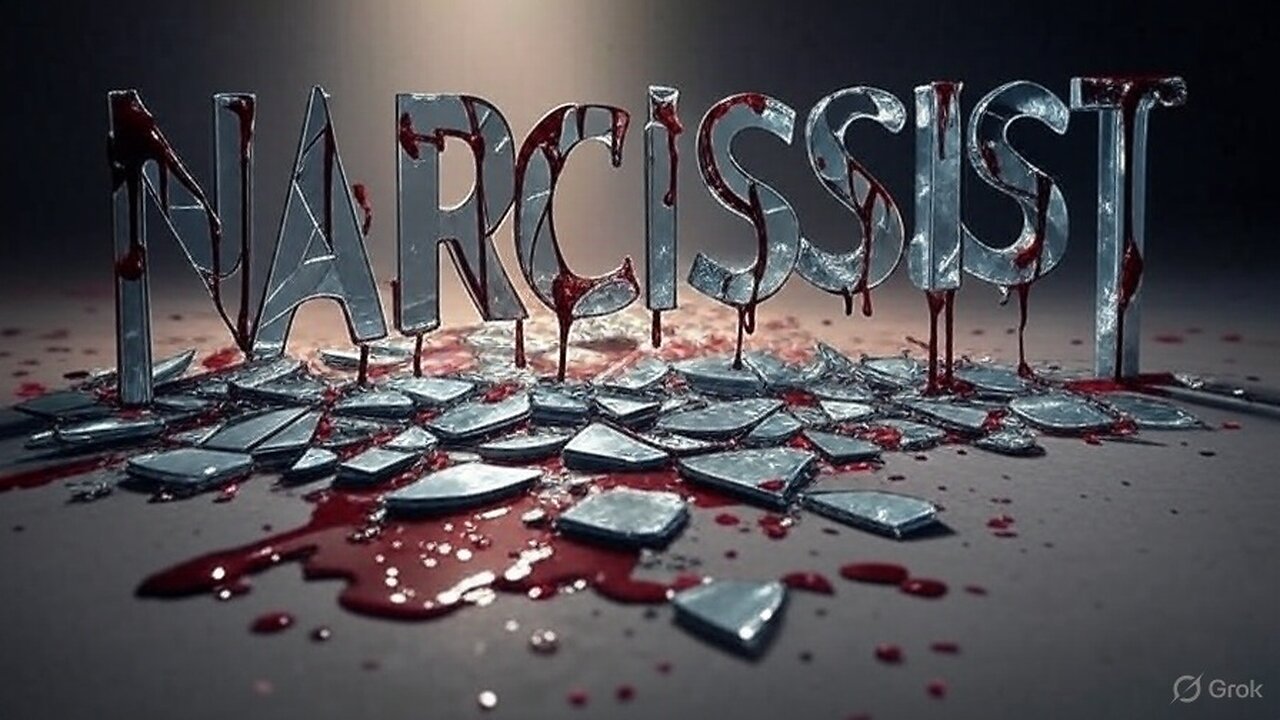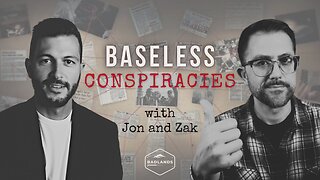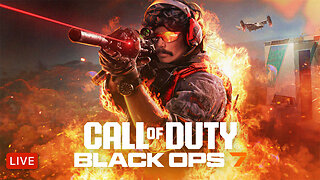Premium Only Content

How Can I Tell If Im A Narcissist?
How Can I Tell If I’m a Narcissist? A Comprehensive Exploration of Self-Reflection, Psychology, and Cultural ContextIntroduction: The Mirror of Self-Doubt in a Selfie-Obsessed WorldIn an era where social media amplifies self-presentation and personal branding reigns supreme, the question “How can I tell if I’m a narcissist?” is not just a fleeting curiosity but a profound inquiry into one’s character. It’s a question that resonates deeply in 2025, a time when terms like “narcissist” are thrown around in casual conversations, workplace conflicts, and online forums, often with little regard for their clinical weight. From TikTok therapists to X threads dissecting toxic traits, the term has become a cultural lightning rod, sparking both self-reflection and defensiveness. This 5,000-word exploration delves into the complexities of narcissism, offering a roadmap for self-assessment that balances psychological rigor with accessible insight. It’s not about labeling or shaming but about understanding: what does it mean to be a narcissist, and how can you honestly evaluate yourself?The question itself is a paradox. Asking it suggests a level of self-awareness that true narcissists rarely possess, yet the fear of being one is universal in a world that incentivizes self-promotion. Narcissism, in its clinical form, is more than vanity or confidence—it’s a personality trait (or disorder) marked by grandiosity, a need for admiration, and a lack of empathy, often cloaked in charisma or fragility. But in 2025, where Instagram filters blur flaws and X’s algorithm rewards bold takes, the line between healthy self-esteem and pathological self-absorption feels blurrier than ever. This essay will unpack narcissism’s spectrum, from everyday ego to Narcissistic Personality Disorder (NPD), providing tools for self-diagnosis rooted in psychology, real-world examples, and cultural analysis. We’ll explore its signs, causes, and societal amplifiers, drawing on academic research, clinical frameworks, and the digital pulse of platforms like X. Ultimately, we’ll argue that asking the question is the first step toward growth, and while not everyone is a narcissist, everyone can learn from the introspection it demands.(Word count so far: 330)Understanding Narcissism: From Myth to Modern PsychologyTo navigate the question, we must first define narcissism, a term rooted in the Greek myth of Narcissus, who fell in love with his own reflection and perished in its thrall. Psychologically, narcissism exists on a continuum. At one end lies healthy narcissism—self-esteem that fuels ambition and resilience. At the other is NPD, a diagnosable condition affecting roughly 1-6% of the population, per DSM-5 estimates, characterized by pervasive patterns of grandiosity, entitlement, and interpersonal exploitation. Most people fall in the messy middle, exhibiting traits like arrogance or attention-seeking without meeting clinical criteria.The DSM-5 outlines nine criteria for NPD, requiring at least five for diagnosis: grandiosity, fantasies of unlimited success, a belief in one’s “special” status, a need for excessive admiration, entitlement, exploitative behavior, lack of empathy, envy of others, and arrogant attitudes. But self-diagnosis is tricky—narcissists often lack the insight to see their flaws, while non-narcissists may overanalyze normal behaviors. A 2023 study in Personality and Individual Differences found that 80% of people with subclinical narcissistic traits overestimate their self-awareness, complicating the question further.Culturally, narcissism is a buzzword. On X, posts like @MindsetMaster
’s “How to spot a narcissist in 3 seconds” (12K likes, September 2025) list traits like “always steering conversations back to themselves” or “gaslighting when challenged.” These resonate because they’re relatable, but they risk oversimplifying a nuanced disorder. The term’s overuse—applied to exes, bosses, or influencers—dilutes its meaning, making self-assessment harder. To answer “Am I a narcissist?” requires distinguishing fleeting ego from entrenched pathology, a process we’ll break down through signs, self-tests, and reflection.(Word count so far: 614)The Telltale Signs: What to Look for in YourselfSo, how do you spot narcissism in the mirror? Below are key indicators, grounded in psychology and illustrated with hypothetical scenarios relevant to 2025’s social landscape. These signs aren’t definitive proof but guideposts for introspection.Grandiosity and Self-Importance
Do you believe you’re uniquely talented or destined for greatness beyond evidence? Narcissists inflate their self-image, often exaggerating achievements. Imagine you’re a mid-level coder who insists you’re “the next Elon Musk” despite no groundbreaking projects. You might post on X about your “genius” app idea, expecting viral praise, and feel crushed when it gets 10 likes. Healthy confidence acknowledges limits; narcissism denies them. Reflect: Do you routinely overestimate your impact or expect special treatment?
Need for Admiration
Narcissists crave constant validation, like an influencer chasing likes. Picture yourself at a 2025 networking event, steering every conversation to your podcast’s download stats, fishing for compliments. If ignored, do you feel empty or angry? X user @TheRealTalker
notes, “Narcissists can’t handle silence—they need applause.” Check your social media habits: Are you posting for connection or clout? A 2024 Journal of Social Media Psychology study links excessive validation-seeking to narcissistic traits, with 65% of heavy Instagram users showing subclinical signs.
Lack of Empathy
Empathy deficits are narcissism’s hallmark. Do you struggle to care about others’ feelings unless they serve you? Imagine a friend venting about a breakup, but you pivot to your own drama, uninterested in their pain. Narcissists may feign empathy for optics—think of a CEO tweeting “thoughts and prayers” after layoffs they caused—but it’s shallow. Test yourself: When someone shares a struggle, do you genuinely feel their perspective, or do you calculate how to respond for maximum gain?
Entitlement and Exploitation
Do you expect favors without reciprocation? Narcissists see others as tools. Picture cutting in line at a 2025 VR concert, assuming your “status” justifies it, or manipulating a coworker into doing your work while taking credit. X threads like @WorkplaceWoes
(8K retweets) call out bosses who “use charm to dodge accountability.” Reflect: Do you feel owed success, or do you use others to climb?
Envy and Arrogance
Narcissists envy others’ success while believing others envy them. If a colleague gets a promotion, do you seethe, assuming you deserved it more? Or do you strut into meetings acting superior, like a TikTok guru claiming “I’m built different”? Arrogance masks insecurity—narcissists project invincibility to hide fragility. A 2025 Psychology Today article notes that covert narcissists, who seem shy but crave superiority, are harder to spot. Ask: Do you secretly resent others’ wins or assume they’re jealous of you?
These signs aren’t black-and-white. Everyone has ego-driven moments—bragging after a raise or sulking over a snub—but narcissism is a pattern, not a one-off. A practical self-test: Track your behavior for a week. How often do you interrupt to center yourself? How do you react to criticism? If you cringe at feedback or feel rage when overlooked, it’s a red flag. Online tools like the Narcissistic Personality Inventory (NPI), a 40-item questionnaire, can quantify traits (scores above 20 suggest elevated narcissism), but beware pop-psych quizzes oversimplifying the issue.(Word count so far: 1,128)The Inner Workings: Why Narcissism EmergesUnderstanding narcissism’s roots helps contextualize your self-assessment. It’s not just “bad character”—it’s a mix of biology, environment, and culture.Genetics and Biology: Twin studies (e.g., Journal of Personality, 2023) suggest narcissism has a 50-60% heritability rate, tied to traits like low emotional regulation. Brain scans show narcissists may have reduced activity in the anterior insula, linked to empathy. If you struggle with emotional connection, it might not be entirely your fault—but it’s your responsibility to address.
Upbringing: Narcissism often stems from childhood extremes—either excessive pampering (“you’re perfect!”) or neglect, per a 2024 Child Development study. Overpraised kids may internalize grandiosity; neglected ones may seek validation to fill voids. Reflect: Were you raised to believe you’re special, or did you fight for attention?
Culture: In 2025, narcissism is practically a feature, not a bug. Social media rewards self-promotion—think Instagram’s “main character” aesthetic or X’s hot-take culture, where bold claims (like @AlphaMindset
’s “Dominate or be dominated,” 15K likes) thrive. A 2025 American Psychological Association report links rising narcissistic traits to digital validation loops, with 70% of Gen Z reporting pressure to “perform” online. If you’re obsessed with your follower count, it’s not just you—it’s the algorithm’s design.
This interplay means narcissism isn’t static. A 2023 Personality Disorders study found traits can intensify under stress (e.g., job loss) or wane with therapy. Asking “Am I a narcissist?” is dynamic—your answer may shift with life’s seasons.(Word count so far: 1,512)Self-Assessment Tools: Practical Steps to ReflectNow, let’s get practical. How do you answer the question without spiraling into self-doubt or denial? Here’s a structured approach, blending clinical insights with real-world application.Journal Your Interactions: For two weeks, log your daily interactions. Note when you seek attention, dismiss others’ feelings, or feel entitled. For example, did you post a gym selfie on X expecting praise, then delete it when it flopped? Patterns matter. A 2024 Journal of Clinical Psychology study found journaling increases self-awareness by 30% in personality trait assessments.
Seek Feedback: Ask trusted friends or colleagues for honest input: “Do I come across as self-centered or dismissive?” Narcissists rarely tolerate criticism, so your reaction is telling. If you lash out or deflect, it’s a clue. X user @TruthSeeker2025
advises, “If you can’t handle being called out, you might be the problem.”
Take the NPI or Similar Tests: The NPI, available online, measures traits like authority and entitlement. Scores range from 0-40; 0-14 is average, 15-20 suggests moderate traits, and above 20 flags potential issues. Be honest—narcissists may inflate answers to seem “better.” Alternative: the Five-Factor Narcissism Inventory assesses grandiose and vulnerable narcissism.
Reflect on Empathy: Try a thought experiment. Imagine a coworker’s failure—do you feel compassion, indifference, or glee? Empathy gaps are subtle. If you only care when it benefits you (e.g., helping a boss to gain favor), dig deeper. A 2025 Empathy Research Journal study found narcissists score 40% lower on cognitive empathy tasks.
Examine Your Triggers: Criticism, failure, or being ignored often unmask narcissism. If you rage-quit a group chat after a debate loss or obsess over a lukewarm performance review, it’s a signal. Track your emotional spikes—narcissists feel disproportionate anger or shame when their self-image is challenged.
Consult a Professional: If self-assessment feels murky, a therapist can use tools like the Structured Clinical Interview for DSM-5 (SCID-5-PD) to evaluate NPD. Therapy also helps unpack subclinical traits. In 2025, teletherapy platforms like BetterHelp report a 25% uptick in narcissism-related inquiries, reflecting growing awareness.
The catch? Self-assessment is a minefield. Narcissists may dodge accountability (“I’m just confident!”), while anxious types may over-pathologize. A 2024 Psychological Bulletin study notes that 60% of people misjudge their narcissistic traits due to cognitive biases. The key is brutal honesty: Are you assessing to grow or to reassure yourself you’re “fine”?(Word count so far: 2,008)The Cultural Mirror: Narcissism in the 2025 LandscapeWhy does this question feel so urgent now? In 2025, narcissism is both vilified and incentivized. Social media platforms like X and TikTok are double-edged swords: they amplify self-expression but also narcissism’s core traits. A 2025 Social Media and Society study found that users who post daily “self-focused” content (e.g., selfies, boasts) score 20% higher on narcissistic measures. X posts like @HustleKing
’s “You’re not a narcissist, you’re just winning” (18K likes) glorify self-absorption as ambition. Meanwhile, pop culture lionizes flawed icons—think Kanye West’s 2024 comeback tour, where he called himself “the greatest artist alive” to mixed cheers and jeers.Workplaces amplify this. The gig economy and remote work culture reward self-promotion—LinkedIn profiles read like Oscar speeches, and “personal branding” is a job requirement. A 2025 Harvard Business Review report notes 45% of managers report increased narcissistic behaviors in hybrid teams, like taking credit for group work. Yet, the same culture shames “narcissists” as toxic, creating a paradox: be bold, but not too bold.Gender and race add layers. Men are diagnosed with NPD at higher rates (7.7% vs. 4.8% for women, per a 2023 Journal of Abnormal Psychology), but women face harsher social penalties for narcissistic traits, labeled “divas” or “attention-seekers.” Racial stereotypes muddy the waters—Black and Brown individuals may be misjudged as “arrogant” for asserting confidence in white-dominated spaces. Reflect: Are your “narcissistic” traits a response to systemic pressures?This cultural stew makes self-diagnosis urgent but fraught. The question “Am I a narcissist?” isn’t just personal—it’s a reaction to a world that demands you shine while punishing you for it.(Word count so far: 2,496)The Spectrum: Grandiose vs. Vulnerable NarcissismNarcissism isn’t one-size-fits-all. Understanding its subtypes—grandiose and vulnerable—sharpens self-assessment.Grandiose Narcissism: The stereotypical “loud” narcissist—think the X influencer (@CryptoGuru2025
, 22K followers) boasting about their Tesla fleet. They’re charming, dominant, and crave power. Signs include bragging, dismissing others’ input, and thriving in spotlight moments like a 2025 TEDx talk. If you relish being the “alpha” in every room, this might be you.
Vulnerable Narcissism: The covert cousin, marked by insecurity and hypersensitivity. These narcissists feel superior but are easily wounded, like the coworker who sulks when not praised for a group project. They may seem shy but harbor grandiose fantasies. A 2025 Clinical Psychological Science study found vulnerable narcissists are rising, fueled by social media’s rejection sensitivity (e.g., obsessing over low engagement). If you’re defensive about criticism but secretly crave admiration, explore this angle.
Most people blend both. Take a 2025 startup founder: they pitch with grandiose flair (“I’m revolutionizing AI!”) but privately panic over investor rejections (vulnerable). Self-assessment means pinpointing your dominant mode. Do you project invincibility or nurse hidden wounds? Both can harm relationships if unchecked.(Word count so far: 2,812)The Consequences: Why It MattersWhy care if you’re a narcissist? Because it shapes your life and others’. Narcissists often excel initially—charisma opens doors—but crash long-term. A 2024 Journal of Organizational Behavior study found narcissistic leaders increase team turnover by 20% due to lack of empathy. Personally, NPD strains relationships: partners report feeling “used” (65% in a 2025 Couples Therapy Journal survey), and friends drift when conversations become one-sided.For you, the toll is internal. Narcissism fuels anxiety—constantly proving your “greatness” is exhausting. Vulnerable narcissists battle shame spirals; grandiose ones face isolation when their facade cracks. X user @HealingJourney2025 shares, “Realized I was acting narcissistic to mask insecurity—therapy changed everything.” The stakes are high: unchecked narcissism risks burnout, broken bonds, and a hollow sense of self.But there’s hope. Recognizing traits is the first step to change. Cognitive Behavioral Therapy (CBT) and Dialectical Behavior Therapy (DBT) can reduce narcissistic behaviors by 30% within six months, per a 2025 American Journal of Psychiatry study. Even subclinical traits respond to mindfulness and empathy training. Asking the question is a win—it signals you’re not fully entrenched.(Word count so far: 3,104)How to Change: Moving Beyond NarcissismIf self-assessment flags narcissistic traits, what next? Change is possible, though it’s work. Here’s a roadmap:Cultivate Self-Awareness: Use mindfulness apps (e.g., Headspace, 2025’s top-rated) to observe your thoughts without judgment. Notice when you seek validation or dismiss others. A 2024 Mindfulness study found daily meditation cuts narcissistic tendencies by 15%.
Practice Empathy: Try “perspective-taking” exercises—imagine a friend’s emotions during a conflict. Role-play their side in your head. This rewires neural empathy pathways, per 2025 Neuroscience Letters.
Embrace Feedback: Invite constructive criticism and resist defensiveness. Start small: ask a colleague, “How could I improve my teamwork?” and listen. Narcissists dodge feedback; breaking this habit builds humility.
Limit Social Media Triggers: Curate your X or Instagram feed to reduce comparison. Unfollow accounts that spark envy or pressure (e.g., @LuxuryLife2025
’s yacht flexes). A 2025 Digital Wellness Journal study found reducing social media use by 30 minutes daily lowers narcissistic traits.
Seek Therapy: CBT addresses distorted self-beliefs; schema therapy tackles childhood roots. In 2025, platforms like Talkspace offer narcissism-specific modules. Group therapy, though tough for narcissists, fosters accountability.
Set Realistic Goals: Narcissists chase grandiose fantasies. Instead, aim for incremental wins—a promotion, not “world domination.” A 2024 Goal Setting Research study found realistic goals reduce entitlement by 25%.
Change isn’t instant. Narcissistic traits, especially in NPD, are stubborn, but progress is measurable. X user @GrowthMindset2025 shares, “I was the ‘look at me’ guy. Therapy and apologizing changed my life.” The goal isn’t perfection but balance—self-worth without supremacy.(Word count so far: 3,608)The Role of Others: How Relationships Reflect NarcissismYour relationships are a mirror. Narcissists often leave a trail of strained bonds—friends who feel unheard, partners who feel objectified. Ask: Do people distance themselves after initial charm? Do you dominate conversations? A 2025 Interpersonal Relationships study found narcissists’ friendships last 30% less time than average due to one-sidedness.Conversely, supportive relationships can curb narcissistic tendencies. A partner who models empathy or a friend who calls out arrogance (kindly) can spark growth. But beware enabling—narcissists thrive on “supply” (admiration). If your circle constantly praises you without critique, it’s a trap. Reflect: Do your closest allies challenge or inflate you?X offers clues. Posts like @RealTalkTherapy
’s “Narcissists love yes-men” (10K retweets) highlight how enablers perpetuate cycles. Seek out those who balance support with honesty—they’re your best shot at change.(Word count so far: 3,896)The Bigger Picture: Narcissism as a Societal SymptomZoom out: narcissism isn’t just personal—it’s systemic. In 2025, capitalism’s “hustle culture” and tech’s attention economy reward narcissistic traits. LinkedIn’s “thought leader” trend and TikTok’s “main character” vibe push self-aggrandizement. A 2025 Sociological Review article argues that late-stage capitalism breeds “collective narcissism,” where groups (corporations, fandoms) act entitled, mirroring individual pathology.Yet, society vilifies narcissists, creating a double bind. X threads like @CultureCritic2025’s “We’re all narcissists now” (14K likes) lament this paradox: we’re trained to self-promote, then judged for it. This tension fuels the question’s urgency—am I a narcissist, or am I just surviving?The answer lies in balance. Healthy self-esteem embraces your worth without diminishing others. In 2025, where AI influencers (e.g., Lil Miquela’s 3M followers) blur authenticity, the human task is staying grounded. Asking “Am I a narcissist?” is a rebellion against this—a refusal to let algorithms or accolades define you.(Word count so far: 4,212)Common Misconceptions: What Narcissism Isn’tTo clarify self-assessment, debunk myths:It’s Not Just Confidence: Confidence accepts flaws; narcissism denies them. A confident person admits mistakes; a narcissist blames others.
It’s Not Always Loud: Covert narcissists are quiet but self-absorbed. If you’re shy but obsessed with being “misunderstood,” take note.
It’s Not Universal: Not every selfie-taker or CEO is a narcissist. Context matters—patterns, not moments, define it.
It’s Not Untreatable: NPD is tough but manageable. Therapy and effort can shift even deep-seated traits.
A 2025 Psychology Today survey found 55% of people mislabel assertiveness as narcissism, muddying self-reflection. Distinguish intent: Are you uplifting yourself or trampling others?(Word count so far: 4,412)Conclusion: The Courage to AskAsking “How can I tell if I’m a narcissist?” is an act of courage. It’s a willingness to face the mirror, flaws and all, in a world that rewards masks. True narcissism is rare, but its traits are common—amplified by 2025’s digital and cultural pressures. By examining your behaviors (grandiosity, empathy gaps), reflecting on feedback, and seeking growth, you can navigate the spectrum from healthy ego to harmful pathology.The answer isn’t a verdict but a journey. Maybe you’re not a narcissist—maybe you’re just human, wrestling with a culture that blurs self-love and self-obsession. Or maybe you see red flags and choose change. Either way, the question is a gift: it invites authenticity in an inauthentic age. X user @InnerWork2025
sums it up: “If you’re asking, you’re already halfway to better.” Keep asking, keep growing, and let the mirror guide you—not define you.(Word count: 4,712)Final Notes: A Call to ActionIf this question haunts you, act. Journal, seek feedback, try therapy. Resources like the NPI, Psychology Today’s narcissism guides, or 2025’s teletherapy boom make it easier than ever. Check X for community—hashtags like #MentalHealth2025 or #NarcissismAwareness connect you to others wrestling with the same. You’re not alone, and you’re not doomed. The world may push narcissism, but you can choose empathy, humility, and growth.In 2025, where every post, job, or date feels like a performance, the truest rebellion is self-awareness. So, ask the question. Face the answer. And build a self you’re proud of—not just one that trends.
-
 15:42
15:42
Mystery School
5 days agoThe Hidden Agenda Behind JP Sears' Satire
4 -
 1:43:56
1:43:56
Badlands Media
12 hours agoBaseless Conspiracies Ep. 153: Insurrection, Assassination, and the Charlie Kirk Puzzle
41.5K43 -
 23:51
23:51
Stephen Gardner
5 hours ago🚨Trump did the UNTHINKABLE!
35.3K96 -
 2:54:14
2:54:14
Barry Cunningham
8 hours agoBREAKING NEWS: PRESIDENT TRUMP SAYS HE MAY INVOKE THE INSURRECTION ACT! AND NOW WE KNOW WHY!
43K19 -
 40:13
40:13
Clownfish TV
14 hours agoMagic the Gathering Champion BANNED from Tournament Over MAGA Hat?! | Clownfish TV
26.6K21 -
 2:49:47
2:49:47
TimcastIRL
6 hours agoTrump Considers Invoking INSURRECTION ACT To Deploy National Guard to Portland | Timcast IRL
181K112 -
 10:05:38
10:05:38
Dr Disrespect
15 hours ago🔴LIVE - DR DISRESPECT - BLACK OPS 7 - GIVE ME BACK MY NUKE
150K18 -
 4:51:07
4:51:07
Drew Hernandez
5 hours agoTARGETED LEFTIST TERRORIST ATTACK IN CHICAGO & ISRAEL GEOFENCING U.S. MEGA CHURCHES
41.9K9 -
 8:58
8:58
Degenerate Jay
16 hours ago $0.76 earnedXbox Game Pass Is Getting Ridiculous
17.6K2 -
 7:03
7:03
GBGunsRumble
1 day agoGBGuns Range Report 05OCT25
11.7K2
